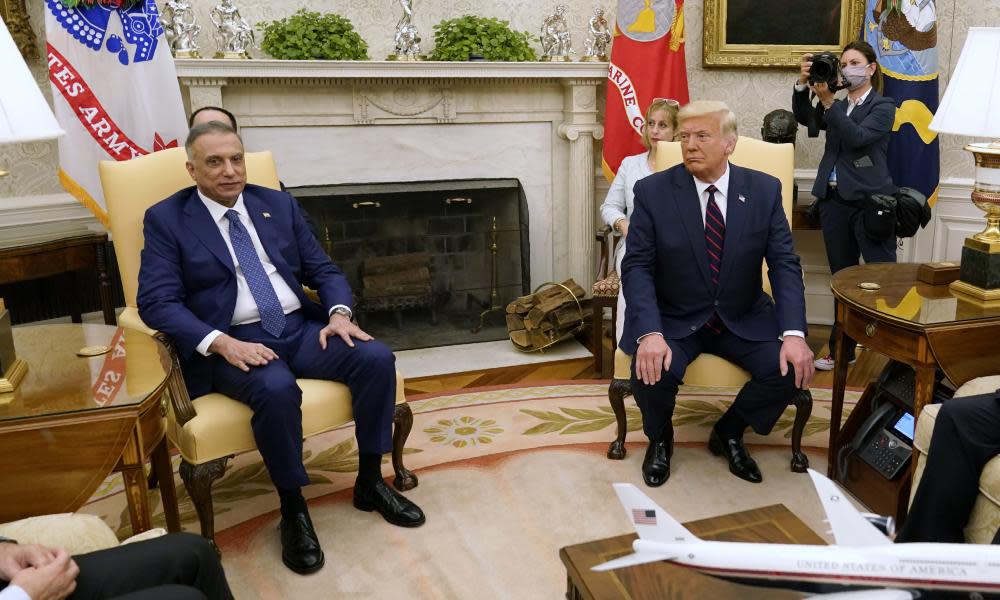Iraqi PM rallies allies to stop US closing embassy after Pompeo threats

Iraq’s prime minister has rallied allies to help stop the US from closing its embassy in the country after the Trump administration threatened to withdraw its diplomats if Baghdad fails to stop persistent rocket attacks.
The ultimatum was delivered over the weekend by the US secretary of state, Mike Pompeo, to Mustafa al-Kadhimi, and was followed by a small-scale evacuation from the fortified mission in what officials saw as a statement of intent.
But it was unclear if the warning was a ploy to force a crackdown on Iraq’s powerful militias, or the first step in a sweeping strategic move to end a 17-year post-war US presence in Iraq.
Kadhimi, a US ally who visited the White House last month, was caught unaware by Pompeo’s demands, which came amid an election campaign so far contested largely on domestic issues. Trump’s few forays into foreign policy have centred on bringing troops home from Iraq and elsewhere and demanding unfettered loyalty from allies, including Baghdad.
Kadhimi is considered more US-leaning than his predecessors, but his authority has been tested in recent months by powerful Iran-backed militias who are believed responsible for an escalating string of rocket attacks on Baghdad’s fortified Green Zone, where the seat of government and diplomatic missions are located.
The barrages have increased throughout a year that started with a US drone strike in Baghdad, which killed the powerful Iranian general Qassem Suleimani and Abu Mahdi al-Muhandis, the leader of one of the militias, Kata’ib Hezbollah.
Since then, Iranian-inspired attacks on US and other western interests have been constant – despite Kadhimi’s insistence that he would put an end to them. His relative powerlessness has led some members of Trump’s inner circle to lose faith in a man they had hoped could be prized from Iran’s orbit.
Another section of the administration, however, insists that Iraq’s geography and post-war experiences have made dealing with Iran an inevitability, and that a naked “with us or against us” approach is doomed to fail.
“The rocket attacks are a trigger for a longer standing and broader issue: the US administration feels that it has invested billions and many lives in Iraq and got little in return,” said former senior EU diplomat Clarisse Pasztory, who spent more than a decade in Iraq.
“Instead, Iran benefited. Trump thinks transactionally and doesn’t swallow conventional wisdom. The argument of sunk costs doesn’t buy. He wants Iraq to either show that it is firmly with the US, and grateful at that, or else to end what Trump sees as a charade.
“I’d guess that Trump thinks first – and maybe even solely – about elections. Leaving Iraq, let alone merely announcing it, is pretty cost free. No US president can afford to see US personnel killed a few weeks ahead of elections.”
A senior regional source said many Iraqi officials had decided the US move was not a ploy, and that the president may in the coming weeks overturn a near-20 year policy which saw a security presence and diplomatic muscle as equally invaluable for a policy to counter Iranian influence.
“I’m not sure it’s a bluff because it costs politically in DC to start an evacuation,” the regional source said. “But it might also be to demonstrate resolve and squeeze Kadhimi into a corner.”
It is unclear if, following Suleimani’s death, Iran still enjoys complete control over Kata’ib Hezbollah and other militia groups, the regional official said.
“Qassem was one of a kind. He invested time and resources into personal relationships which were reinforced over three decades. He could be cunning and compassionate, and threaten and reward Iraqi actors. He knew the game, and played it exceptionally well. Qassem exploited Americans’ limits in ways that helped him advance the Iranian cause.”
Related: After Suleimani: Iran's scramble to recover from general's death
The official argued that the assassination of Suleimani, one of the most powerful figures in the region, had neutered both the US and Iraq’s ability to deal with Iran.
“The Americans used to use Iraqi presidents and officials capable of talking to both sides to deliver messages to Qassem. And he could get the job done. Who do they go to now? It’s a tragic state of affairs, with no hope in sight for the country.”
The intelligence community has also been alarmed by Pompeo’s phone call and the challenge to Kadhimi it implies.
“I am worried that Trump’s approach may in fact abandon what has been a huge investment in Iraq, blood and resources,” said Marc Polymeropoulos, who retired from the CIA’s Senior Intelligence Service in 2019, and spent the majority of his career working on the near east including Iraq.
“Iraq may call our bluff … Then what? Do we cede Iraq to Iran, which happens if we pack up and leave. That is not in the US’s interests and that is the danger of this approach. Without a big US footprint – which includes all elements of US power, military, intelligence, aid, diplomatic – Iran fills the vacuum immediately.
“We cannot do this from an adjacent country. We must be inside of Iraq. I would imagine that we will come to a workable solution, where the Iraqis make security improvements so that we can stay.”

 Yahoo News
Yahoo News 
